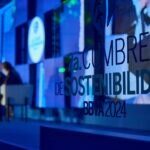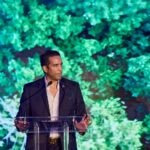At the 2nd BBVA Mexico Sustainability Summit recently held in Mexico City, all the companies participating in the event were urged to press ahead with their energy transition processes. The participants agreed that banks are the key enablers in this process through the funding and expert advice they provide, allowing businesses to transition toward an emission-free economy that embraces all industries and segments of society.

The event was attended by Carlos Torres Vila, Chair of the BBVA Group, Eduardo Osuna Osuna, Vice President and CEO of BBVA Mexico, Javier Rodríguez Soler, Global Head of Sustainability and Corporate and Investment Banking (CIB) at BBVA, Sergio Torres Lebrija, Head of Sustainability at BBVA Mexico, Mark Wiedman, Head of the Global Client Business at BlackRock, and Emmanuel Faber, Chair of the International Sustainability Standards Board, alongside various representatives of the United Nations, McKinsey, Tecnológico de Monterrey. Also present were 280 leading business clients from Mexico, who are ready and able to help others embrace a sustainable approach to business.
During the opening ceremony, Carlos Torres Vila remarked that “for banks to be able to support the economy in decarbonization and sustainability, governments need to be ambitious in their goals and create an enabling environment. This means introducing policies, incentives and frameworks that encourage financial institutions, corporations and the public to invest in sustainability”. The BBVA Chair was confident that the new Mexican government would prioritize these key concerns.
“Our vision is to create an ecosystem that allows our clients to make this transition (toward sustainability), as we become their advisors and generate a broader impact”
Those present at the Sustainability Summit also learned about BBVA’s new reporting plans, as the Group is all set to join a global initiative to promote a new standard of reporting on sustainability, especially on climate issues. This initiative is the brainchild of the International Sustainability Standards Board (ISSB) and will allow companies to report information in a consistent and comparable manner, thus improving decision-making in the financial sector.
In the case of Mexico, Eduardo Osuna Osuna shared some compelling data on BBVA’s sustainability strategy: “Between 2020 and 2024, we mobilized more than 580,000 million pesos” (roughly €30 billion). “Between January and May 2024 alone, we channeled 100 billion pesos into climate change projects and 33 billion pesos into social initiatives,” he explained, while reiterating that “our vision is to create an ecosystem that allows our clients to make this transition, as we become their advisors and generate a broader impact.”
The major challenge posed by sustainability around the world
During the summit, key figures were shared in relation to the wider process of making the global economy net zero. Notably, this will require an investment of around $275 trillion by 2050, equivalent to 8 percent of the world’s annual GDP. To preserve and regenerate natural capital, close to $30 trillion will be required over the next decade.
While talking with Javier Rodríguez Soler, Global Head of Sustainability and Corporate and Investment Banking at BBVA, Mark Wiedman, Head of Global Client Business at Blackrock, remarked that "Global investment in critical infrastructure and low-carbon energy projects is surging, but emerging markets - like Mexico – have remained flat. BlackRock is helping to close this gap by leading in transition investing and blended finance, which combines funds from governments, philanthropies, and private investors. We are excited about what this opportunity means for Mexico and our clients."

Mark Wiedman, Head of Global Client Business at BlackRock, and Javier Rodríguez Soler, Global Head of Sustainability and Corporate and Investment Banking at BBVA
“Sustainability is not here to save the planet, because the planet is going to be there anyway, it’s about saving everyone who lives on it”
Meanwhile, the Chair of the International Sustainability Standards Board (ISSB), Emmanuel Faber, explained the objectives and work underway to develop sustainability standards. In his presentation, he addressed the importance of sharing information on financial decisions and for the financial system. In his eyes, “Sustainability is not here to save the planet, because the planet is going to be there anyway, it’s about saving everyone who lives on it.”
At one of the round tables, representatives of the United Nations, the National Autonomous University of Mexico (UNAM), the International Finance Corporation (IFC) and BBVA analyzed the troubling water challenge now facing Mexico. The experts all pointed to the problem of water scarcity and the worrying data generated by scientific models.
“The north of the country is getting drier and drier. Extreme events are becoming increasingly commonplace, and the more CO2 emissions we cast into the atmosphere, the less it will rain,” warned Francisco Estrada, coordinator at the UNAM.

Emmanuel Faber, Chair of the International Sustainability Standards Board (ISSB)
Meanwhile, Adolfo Osorio, Head of Global Clients and Sustainability at CIB BBVA Mexico, cited the “immense opportunity we now have to finance water projects in Mexico.” He also pointed to the availability of funding and the strong appetite shown by financial institutions, banks and investors in the country to support the development of these crucial projects. In his view, “the main challenge to overcome is the lack of comprehensive, long-term planning, as the right market conditions and financing structures are there.” He also outlined the investments that BBVA is now making in the capital of companies that are developing climate technology innovations or ‘cleantech’ to achieve the net zero ambitions. “It is estimated that 45% of the technologies are already developed, but it is important to scale them up in order to make them financially viable,” he concluded.
BBVA Mexico’s National Sustainability Challenge
Sergio Torres Lebrija, Head of Sustainability at BBVA Mexico, shared further details on the progress made toward the National Sustainability Challenge launched last year by BBVA: the initiatives of the three finalists and the special mention are already more than 50% complete on their way to finding solutions against the threat of sargassum seaweed. As a further step forward in this project, the Mexican bank’s sustainability expert announced that the second BBVA National Sustainability Challenge is now ready to go, which will address an issue that has been troubling many Mexicans. “On July 15, we will be sharing all the details surrounding the launch of this fantastic initiative, which we are confident will contribute to the well-being and progress of Mexico,” he remarked.

Sergio Torres Lebrija, Head of Sustainability at BBVA Mexico
The 2nd BBVA Mexico 2024 Sustainability Summit split the participating companies into six working groups, divided by industry, in which they discussed and proposed a series of initiatives to be applied in the real estate, hotel and entertainment, industry, automotive, agriculture and retail sectors.
“The importance of preserving natural capital, which is especially important in a country like Mexico”
Javier Rodríguez Soler, BBVA’s Global Head of Sustainability and Corporate and Investment Banking, gave the closing address, in which he thanked all the panelists and attendees for taking part and underscored “the importance of preserving natural capital, which is especially important in a country like Mexico.”
He also proclaimed that the summit had earned Eventsost certification, meaning that ESG criteria were observed when planning, designing and staging the event. These criteria are aligned with the Sustainable Development Goals of the 2030 Agenda and address matters such as circular economy, minimization of greenhouse gas emissions and social inclusion.

Javier Rodríguez Soler, BBVA’s Global Head of Sustainability and Corporate and Investment Banking at the closing of the 2nd BBVA Mexico Sustainability Summit